Movie Review – Avengers: Age Of Ultron
– Summary –
Director : Joss Whedon
Year Of Release : 2015
Principal Cast : Robert Downey Jr, Chris Evans, Scarlett Johansson, Chris Hemsworth, Tom Hiddleston, Paul Bettany, Mark Ruffalo, Jeremy Renner, Samuel L Jackson, Don Cheadle, Elizabeth Olsen, Aaron Taylor-Johnson, Cobie Smulders, Stellan Skarsgard, James Spader, Haley Atwell, Andy Serkis, Thomas Kretschmann, Claudia Kim.
Approx Running Time : 141 Minutes
Synopsis: When a dangerous artificial intelligence threatens the existence of everyone on Earth, the Avengers band together again to stop global annihilation.
What we think : Blockbusting entertainment doesn’t come much more blockbusteringer than Age Of Ultron, the sequel to The Avengers and the eleventh film in the Marvel Cinematic Universe. Teeming with heroes and villains, paying off some minor subplots and ignoring many others, as well as delivering a more humorous film than the MCU has yet enjoyed, Age Of Ultron delivers explosions, laughs, thrills and adventure in spades. It might not make much sense (or, if the resolution is much to go by, much impact on the franchise overall), but when you’re having this much fun, it’s a jaded cynic who can’t see the bright side about the fun to be had.
****
**This review of Age Of Ultron contains spoilers for the point of this discussion.**
There are a few strings on this.
As an exercise in blockbuster filmmaking, Joss Whedon’s second Marvel film, Avengers: Age Of Ultron, has a lot stacked against it. In order to succeed, it had to overcome almost impossible odds of storytelling, expectations from both the studio and the willing audience, address the pacing and uneven tone of the previous (box-office slaughtering) original, and deliver even more new characters into the Marvel Cinematic Universe than any previous film before it. Whedon pulled off a minor miracle in making The Avengers the success it became, not the least due to his ability to give each character in an ensemble – at worst – a decent story arc. Age Of Ultron upped the stakes considerably for Whedon by wholly adding to the vast array of super-humans, mutants and average Joes, almost negating the ability of anyone to give the film an emotional weight to support such world-challenging heroics.
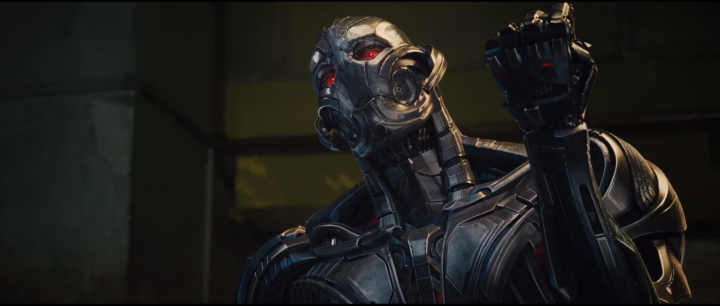
Part of the success of the Avengers franchise – I use the term to umbrella the entire MCU canon of films – is its inherent interlaced narrative structure, and how it parallels the world of comics from which it’s borne. The ability of a shared universe allows characters from one film, say Iron Man or Captain America, to appear in each others’ films, and so on. With this unique approach to film-making comes a set of problems equally unique; often, sequels within this universe of films rely too much on audience’s familiarity with the characters, often forgetting to provide some context or backstory to previous adventures which might have a bearing on events in the current one. To-date, Marvel’s ability to overcome this issue has been built across multiple films which have, largely, met with enormous critical and commercial success.
The progenitor to Age Of Ultron, 2012’s The Avengers, remains the third highest grossing movie of all time, no small feat for a bunch of admittedly second-tier characters used because the X-Men, Fantastic Four and Spider-Man were owned by other studios. There’s little doubt Age Of Ultron will do similar work, when the dust settles, but it was always going to be a tough ask reproducing the same vivacious energy the original film had working in its favor. Age Of Ultron needed to deliver more of what Avengers excelled in – namely, large screen excitement and mind-blowing action. It also needed to avoid some of the lethargy The Avengers’ middle-act encumbered, making the original film so much less “re-watchable” as an event movie than its initial run enjoyed.
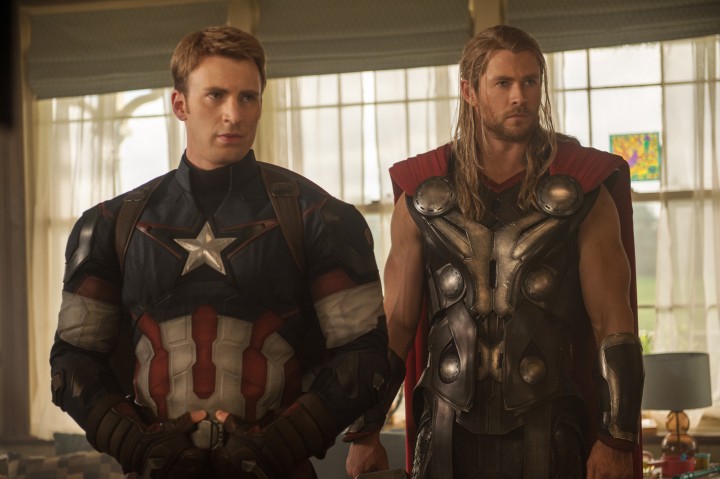
Joss Whedon has, miraculously, more than accomplished this. Age Of Ultron is definitively a “blockbuster” event film, a film designed to capitalize on the popularity of its enormously likeable cast and immensely iconic heroic figures. Not without caveat, mind, but with what Whedon had to work with, and the constraints under which this needed to be achieved, he’s provided us with something only a short walk from generationally great. Age Of Ultron steals its primary antagonist from the Marvel comic books, although retrofitted to exist within MCU canon. Ultron is a creature devised by Tony Stark, played by Robert Downey Jr once more, as a way of protecting the Earth from threats beyond our atmosphere, threats made real following the Chitauri attack from the earlier film. As a sentient AI, Ultron decides that protecting the Earth means removing the living beings that inhabit it – us – thereby fulfilling his mission to make Earth a peaceful planet. Naturally, once the Avengers realize the danger they’ve unintentionally inflicted upon the Earth, they must band together to save it.
A film like Age Of Ultron, in which established characters, new characters, and another world-destroying plot, might struggle within its own borders to achieve a sense of balance between character development and the requisite explosions. With so many balls to juggle, even a maestro character guy like Joss Whedon could struggle to keep the balance, the tone, and the pacing, just right. In almost every respect, Whedon succeeds magnificently, and where he doesn’t, I’m prepared to cut him a lot of slack. The demands of blockbuster films make such a task literally herculean, and although Age Of Ultron isn’t without some faults, lack of entertainment (which is what we’re here for, right?) isn’t chief among them.
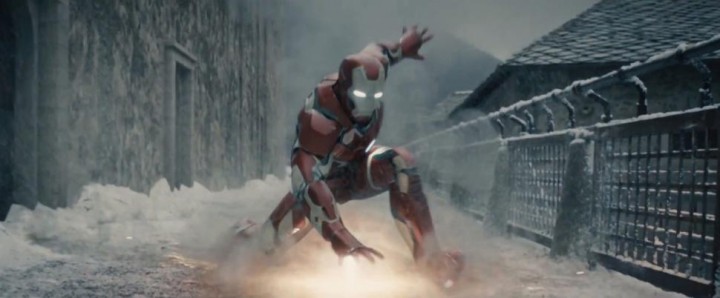
The film opens strongly, with a large-scale assault by Team Avenger on an Eastern European Hydra stronghold run by Baron von Strucker (Thomas Kretschmann, who cameoed in this role at the end of Captain America: The Winter Soldier), where we are also introduced – properly – the other two cameos from TWS‘ credit sting, Pietro and Wanda Maximoff (Kick-Ass star Aaron Taylor-Johnson, and Elizabeth Olsen, respectively), two “enhanced” beings who make life tough for Stark, Banner, Rogers and Co. From there, we return to a Stark-run party in New York, where both Stark and Bruce Banner (Mark Ruffalo) come up with stolen Chitauri tech as a way to improve the former’s Iron Legion, a planetary peacekeeping drone system, and prevent attacks from threats both Earthbound and offworld. So when this tech becomes self aware, and decides humanity needs to be obliterated, the rest of the Avengers team are a tad aggravated with Tony’s arrogant decision to use the tech thusly. The AI, named Ultron (voiced by a terrific James Spader), assumed the physical body of some of the Iron Legion, before escaping to create an entirely new body, in which his intelligence (read: soul) will eventually be encased.
Returning to the fray are Thor (Chris Hemsworth), Captain America (Chris Evans), Natasha Romanoff (Scarlett Johansson), and Clint “Hawkeye” Bartram (Jeremy Renner), all of whom are affected by Ultron’s new allies in the Maximoff twins. After having their asses handed to them, the Avengers regroup at a safehouse, where we learn that Hawkeye has secreted a family – a pregnant wife and two young children – as a way of remaining somewhat human amidst the superheroics. Age Of Ultron’s end-game might not be the universal impact that the first Avengers film was (Ultron thinks only of Earthy issues, whereas the Chutauri has more cosmic designs in mind) but as a showstopping adventure into apocalyptic conflagration, it delivers some tense, albeit technobabble-ridden plotting designed to examine the team as a unit, and the individual players as characters. Whedon balances the differential well, although not flawlessly, with some characters consigned to merely punching-bag status (Thor), and romantic subplotting (Black Widow), whilst formerly third-rate characters like Hawkeye are given huge boosts to their development.
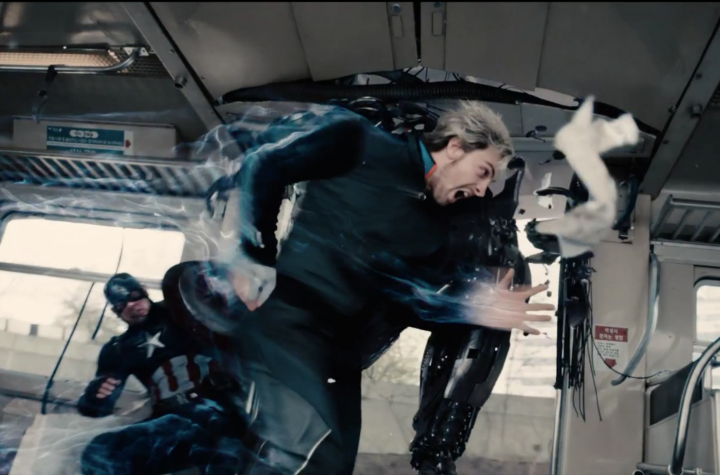
It’s a testament to Whedon’s writing and direction that the film functions in its purpose anywhere nearly as well as it does. In keeping the character balls in the air, and moving them across the screen with as an assured hand as he does, Whedon crafts a film that lacks decided emotional wallop (I mean, aside from Hawkeye’s family subplot, the rest of the characters remain aloof to a large degree) but is still distinctly enjoyable. Age Of Ultron clocks in at some 2 and a half hours, and it contains enough collateral damage and destruction for about three films, let alone one. Yet throughout it all, Whedon’s canny writing enables us to focus on whichever character we need to within the moment to move the film along. This should in no way be seen as a strength, for genuinely great films remain emotionally connective even when the world’s exploding, but in terms of maintaining a narrative aesthetic, plus the demands of Marvel’s expansion plan, Age Of Ultron plasters over its seams and cracks with wit and wonder.
Indeed, this film is easily the funniest Marvel movie thus far. Dialogue, a facet Whedon is renowned for, sparkles as this roster of terrific actors deliver jibes, asides and outright put-downs with aplomb. And not just the heroes either; Spader’s Ultron has a decidedly ironic wit, and I caught myself laughing more than once at his wonderfully droll delivery. Stark and Rogers enjoy their usual patter of alternative ideologies, although perhaps not so presciently as the SHIELD helicarrier stuff from the first film. Romanoff and Banner enjoy an out-of-the-blue romance that feels more constructed than organic (I’m not sure of the end-game to this arc, because it’s unresolved by the time the credits roll), and Banner’s anger management issues once more take up the bulk of Ruffalo’s emotional investment. But the humor is threaded throughout this film really nicely. A key sequence involving a few of the Avengers trying to lift Thor’s hammer, Mjolnir, (which was teased in the numerous trailers) pays off towards the end of the film in what is the movie’s biggest gag. Throwaway laughs, like Roger’s ability to tear apart tree trunks, the Hulk’s rage-fuelled destruction of so much public property and Tony’s attempts to curtail it, not to mention James Rhodes’ (Don Cheadle) attempts to up his hero quotient by relating stories of his War Machine efforts, make many moments in this movie sing. But some jokes fall flat – Stan Lee’s obligatory cameo is awful, and Tony Stark’s continual asides to nobody occasionally border on inane.
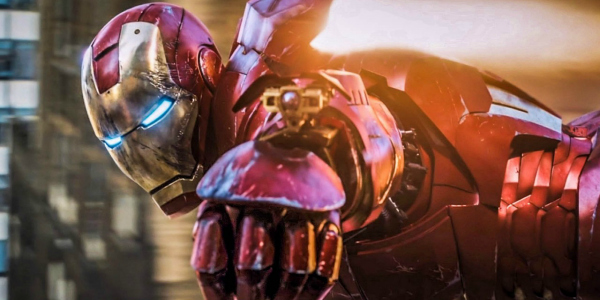
Easily the biggest howdy-whoop of the film for me is the touted introduction of Vision, an artificial lifeform created by Ultron to be his new “body”, but instead brought to life by the intelligence of Tony Stark’s AI, JARVIS (voiced by Paul Bettany, who also plays the physical embodiment of Vision). While his creation is smothered by comic-booky technical wordplay, and his actual intention remains unclear even by this film’s simplistic standards of exposition, seeing Bettany come to life on screen as the android made of Vibranium (the same metal Cap’s shield is created from) is a moment I’ve waited for since I heard the character was coming. Note too, the further extrapolation of the Infinity Stones premise, an undercurrent of the entire Marvel cinematic world since we first saw Thanos at the close of The Avengers. Indeed, the mad Titan makes a very small cameo in Age Of Ultron’s inevitable mid-credit stinger. (There is no post-credit scene, though, so be aware of that) Small bit-parts to Andy Serkis, as Ulysses Klaw, an enemy of upcoming Marvel hero Black Panther (a cross-promotional job no doubt written in to bring the African character within the context of the MCU), and Cobie Smulders (as SHIELD operative Maria Hill), as well as returning cameos to Idris Elba and Hayley Atwell, make the surprise element of the film rather enticing – who else might show up, you wonder! – but it’s the film’s end sequence that has to deliver the good when it matters.
Age Of Ultron’s final showdown, with Ultron somehow managing to lift an entire city out of the ground (beat that, Magneto!) in an attempt to smash it into the planet and create an extinction level event, is just jaw-dropping. In both scope and execution, not to mention the myriad character beats Whedon is saddled with, Age Of Ultron’s climactic battle is both rip-roaring good fun, and terrifyingly intense at the same time. It’s inaccurate to say Age Of Ultron does for Marvel what Empire Strikes Back did for Star Wars, and if I was miffed at anything it was the lack of moments like Coulson’s death in Avengers for shock value (in saying that, at least one Avenger character does croak before the end, but it’s not who you might think, so there’s that); as what is supposedly a “middle film” before the two-pronged Infinity War opus kicks off at the end of this decade, Age Of Ultron is resolutely safe.
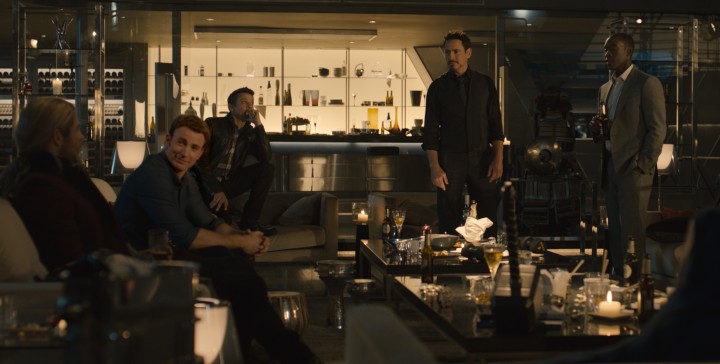
Another thing Age Of Ultron didn’t do that I was expecting it to, was build to the third Captain America film, Civil War, a now-classic storyline from the comics in which Stark and Rogers are on opposing teams when Government mandated identity-reveals put them at loggerheads. Age Of Ultron doesn’t – least not from what I could make out – even hint at events to come, and this was particularly disappointing on a personal level, because I wanted to at least see the organic commencement of hostility between the two. They have a few moments of angst, yes, but it’s nothing to do with events to come. If you’re expecting it, forget it.
Age Of Ultron does what’s needed. It’s explosive at the expense of majority character development, and it’s utterly entertaining. There’s just enough plot and character development in this to prevent us confusing it with a Transformers movie, and Whedon’s skill as an ensemble director is tested to breaking point by the clutter of heroes both main and ancillary. Although it struggles with its own identity inasmuch as this is a film of necessity as opposed to organic story requirements, you can’t fault Age Of Ultron for going balls-to-the-wall bigger with what it hopes is popcorn guzzling thrill-ride designed to showcase the best Hollywood money can buy. It certainly achieved that.
The question will always be whether or not it’s better than the first Avengers – the answer is a resounding yes – with a sub-question of where it stands within the Marvel pantheon of movies – above most, below only Guardians Of The Galaxy and The Winter Soldier, in my opinion – but if it’s large-scale entertainment you desire, and are familiar with Marvel’s world building (face it, if you’re not into it at this point, Age Of Ultron might as well be an alien language for all the sense it’ll make) then you’ll have a blast with this entry.

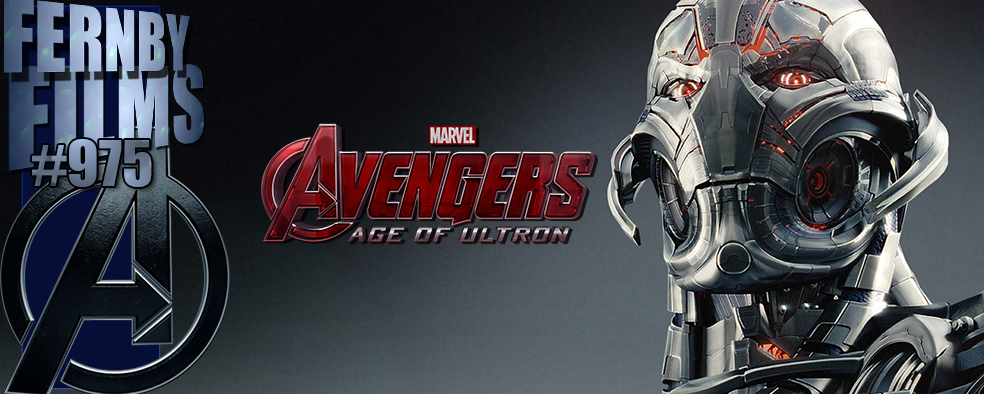
Pardon me not reading the review so I'll be as fresh as possible when I watch it, Rodney. Glad to hear you love this one though.
My recent post FlixChatter Review: Ex Machina
My spoiler free video review is right below this article on the frontpage, Ruth! You should watch that instead!
I skimmed the review, admittedly, because I didn't want to get too inundated with spoilers. What I noticed, though, was that you seem to like the movie because it should have been terrible but wasn't. Is that right? Are you being too easy on it? Because the first Avengers was a borderline trainwreck, and with Whedon at the helm (and with even MORE characters), I can't see this one being any better.
No, I liked the movie because I thought it should have just collapsed under its own weight, which it did not. While I hold the first Avengers film in higher regard than you, this sequel is actually better, more action packed, and less reliant on reestablishing characters – if you don't know who these people are by now, you have no business watching this movie! – and for that, I think it worked better the second time. Just my 2c.
As you've probably read I enjoyed it slightly less as I was longing for some character development or a bit more emotional moments. Action was enjoyable and loved the short cameo by Julie Delpy
Yeah, I knew she was in this and I almost missed her. Such a small role. Maybe her character (or rather, her role in Black Widow's past) will be explored further in future films.